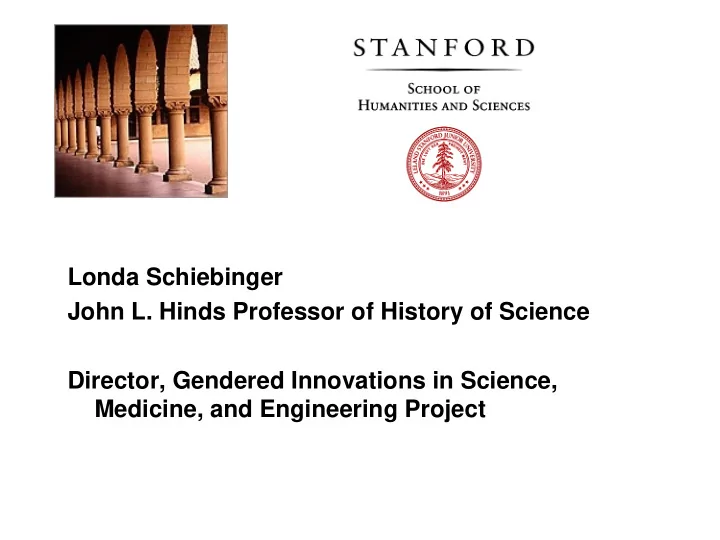

Londa Schiebinger John L. Hinds Professor of History of Science Director, Gendered Innovations in Science, Medicine, and Engineering Project
Three Policy Approaches Three Policy Approaches 1. Increasing the Participation of Girls and W omen in S&T, or Fixing the Numbers of Women 2. Transforming Educational and Research Institutions, or Fixing the Institutions **3. Enhancing Scientific Excellence, or Fixing the Knowledge
Programs to Support Girls and Women Programs to Support Girls and Women Data collection 1. Data collection 1. Programs supporting education and 2. Programs supporting education and 2. careers careers
Women’s share of doctoral degrees in science and engineering (2009), Japan:
Three Policy Approaches Three Policy Approaches 1. Increasing the Participation of Girls and W omen in S&T, or Fixing the Numbers of Women 2. Transforming Educational and Research Institutions, or Fixing the Institutions
� Cultural stereotypes � Gender bias in hiring and promotion � Women’s disproportionate domestic and care work � Work/life balance � Making S&T education female friendly � Considering dual-Careers � Career breaks � Etc.
� U.S. University of Michigan’s Strategies and Tactics for Recruiting to Improve Diversity and Excellence (STRIDE) Programme � EU: GenSET
Three Policy Approaches Three Policy Approaches 1. Increasing the Participation of Girls and W omen in S&T, or Fixing the Numbers of Women 2. Transforming Educational and Research Institutions, or Fixing the Institutions **3. Enhancing Scientific Excellence, or Fixing the Knowledge
Gender bias limits the objectivity and excellence of S& T, and hence its potential benefits to society.
But focusing on bias is not a productive strategy • We need to enhance scientific excellence by mainstreaming gender analysis into S& T.
Gendered Innovations . . .employs gender analysis as a resource to create new know ledge or design.
Not for Women Only Not for Women Only Everyone can— —and must and must— —learn how to learn how to Everyone can do gender analysis. do gender analysis.
Gendered Innovations Gendered Innovations � Sex and gender Sex and gender analysis analysis acts as yet another acts as yet another � experimental control— —one among many one among many— — experimental control providing critical rigor in science. providing critical rigor in science. � Gender Gender analysis analysis opens the door to innovation opens the door to innovation � in science, medicine, and engineering— —and and in science, medicine, and engineering by doing so enhances the lives of both men by doing so enhances the lives of both men and women. and women.
Three ‐ Point Seatbelt
European Union Directorate-General for Research � “whether, and in what sense, sex and gender are relevant in the objectives and in the methodology of the project” EU’s 6 th Framework Program (2002-2006 )
� World Health Organization � Canadian Institutes of Health Research � Others??
Next Steps: � Develop internationally agreed upon methods of sex and gender � Train the current generation of researchers and policy makers in gender methodology . � Train next generation in gender analysis— i.e., mainstream gender analysis into S&T curriculum.
Practical initiatives: � Granting agencies � Hiring and promotion committees � Editors of peer-reviewed journals
What is to be Done? What is to be Done? Fix the number of women Fix the institutions * * Fix the knowledge
Recommend
More recommend